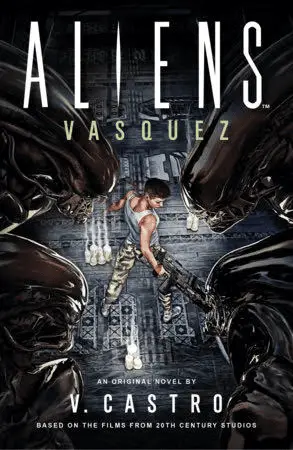Epeolatry Book Review: Aliens: Vasquez by V. Castro

Disclosure:
Our reviews may contain affiliate links. If you purchase something through the links in this article we may receive a small commission or referral fee. This happens without any additional cost to you.

Title: Aliens: Vasquez
Author: V. Castro
Genre: Science Fiction
Publisher: Titan Books
Release Date: 24th October, 2023
Synopsis: A groundbreaking Latinx Aliens novel by a rising star Latina author, featuring the fan-favorite character PFC Jenette Vasquez from the hit movie Aliens and the family she is forced to leave behind.
For the very first time, the canonical background of the breakout Aliens hero Jenette Vasquez, as well as the story of the children she was forced to leave behind as written by the rising Latina horror star V. Castro (Queen of the Cicadas).
Even before the doomed mission to Hadley’s Hope on LV-426, Jenette Vasquez had to fight to survive. Born to an immigrant family with a long military tradition, she looked up to the stars, but life pulled her back down to Earth—first into a street gang, then prison. The Colonial Marines proved to be Vasquez’s way out—a way that forced her to give up her twin children. Raised by Jenette’s sister, those children, Leticia and Ramon, had to discover their own ways to survive. Leticia by following her mother’s path into the military, Ramon into the corporate hierarchy of Weyland-Yutani. Their paths would converge on an unnamed planet which some see as a potential utopia, while others would use it for highly secretive research. Regardless of whatever humans might have planned for it, however, Xenomorphs will turn it into a living hell.
Despite boasting a screen time tally of fewer than thirty minutes, Private Vasquez (played by Jenette Goldstein) steals a lion’s share of the scenes in James Cameron’s 1986 sci-fi terror flick Aliens, but very little is communicated about the character’s background—including her full first name. V. Castro remedies this in Aliens: Vasquez, first by giving the character the same name as the woman who first inhabited her, and then, by flushing out what made Cameron’s charismatic bad ass the woman she is by the time she sets foot on the LV-426 colony.
In Castro’s construction, as a girl, Jenette Vasquez “would run around the house, imagining new worlds with monsters to kill,” and as a teen, “wondered what gods or demons were left to be met in her life,” both clear foreshadowings of her eventual career and subsequent demise. However, before joining the Colonial Marines, Jenette suffers a number of tragedies and lands herself in juvenile detention. It is here that she begins to develop her impressive physique and meets someone who would become one of her best friends (Mark Drake, played by Mark Rolston in Cameron’s version) over the rest of the canon, when the two bond over pumping iron and join the military. Their close relationship—which is evident in the film, especially when Vasquez mourns Drake’s death—makes Castro’s building of their friendship both bittersweet and nostalgic. By the time Part I of the novel is complete, however, Jenette Vasquez is dead. A two-page replay of her xenomorph acid splash and subsequent sacrifice alongside Lieutenant Gorman wraps up the chapter, prompting the reader to ask, where do we go from here?
This is the reason the book is not titled Aliens: Jenette Vasquez. The remainder of Castro’s novel focuses on the next generation: Jenette’s twin children, Leticia and Ramon. The former follows in her mother’s footsteps as a soldier while the latter climbs the corporate ladder after a full scholarship to Harvard University. Eventually, the siblings’ paths intertwine as Ramon takes a lead position with Weyland-Yutani, the very company responsible for his mother’s demise.
A few tropes from the Aliens universe resurface here, from the villains of evil corporations risking human lives in order to profit from xenomorph capture and study, to the xenomorphs themselves quickly evolving beyond the restrictions placed by those humans (and androids) foolish enough to try and harness them. Leticia forms a bond with a wealthy financier, Jacob Vickers, a descendant of Meredith Vickers, a character inhabited by Charlize Theron in the Prometheus film, and Castro holds her cards close to the vest regarding whether Jacob can be trusted initially, allowing enough suspicion to make his relationship with Leticia more than just a side hustle for some time in the sack.
Outside of her attention to detail, Castro’s greatest asset in Vasquez is the deliciously disturbing description in her action sequences, most of which fall in the fifth and final section of the novel. Consider this example, when a xenomorph-infected civilian manages to escape quarantine and horrifying chaos ensues: “There was a crack with the pop of a busted piñata, and a slimy creature exploded from the dying man’s sternum. Bone, blood, and viscera erupted from his body with the speed of an active volcano. He clawed at his chest, trying to hold the sharp-toothed monster biting at the air as it whipped around to escape the ruined chest.” It’s a scene every fan of the canon is familiar with as images, and Castro succeeds in capturing that terror in words.
On a fun side note, despite setting it centuries into the future, Castro slickly slides some contemporary social commentary into Vasquez, including a conversation with Leticia’s tattoo artist, who thanks her customer for “going for the hand of an artist instead of a machine,” to which Leticia replies, “If it’s done by a machine, can it be considered art?”
A scene-by-scene novelization of a film provides an author with a skeleton to wrap a story around; a novel completely unrelated to any previously established plotline gives an author free reign to do what s/he wishes with a story. However, Castro was given a playground bound by the tightest of fences: she had to stick to an established canon while simultaneously developing a new set of characters who could operate seamlessly within a well-known story arc—one with a legion of loyal fans. To the author’s credit, she nails the assignment, not only by maintaining the tone and essence of the original source material but by integrating fun Easter eggs for diehard fans. For instance, when the crew is battling an onslaught of xenomorphs, the beasts are “frightening enough for Leticia to believe that dark gods existed to craft such perfect harbingers of destruction,” a blatant nod to the origin story hinted by Ridley Scott’s Prometheus (2012). El riesgo siempre vive (Those who risk always live) is a phrase both repeated by multiple characters throughout the book and emblazoned on Private Vasquez’s armor in Cameron’s movie: Goldstein herself inscribed it on her costume when the director charged the cast with personalizing their set pieces. It is because of the author’s careful research that Castro’s entry blends so smoothly into the Aliens universe, expanding on a much-beloved and previously underdeveloped character and establishing a place in the mythology for even more spin-offs to flourish.
![]()
/5
- About the Author
- Latest Posts
Rebecca Rowland is an award-winning dark fiction author and the best-selling editor of seven horror anthologies. Find links to her latest work on RowlandBooks.com, take a peek at what shiny object she’s fixating on @Rebecca_Rowland_books on Instagram, or just look for her table at author conventions: she’s that painfully awkward gal who can’t sit still.













